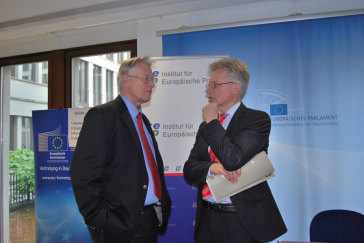IEP Lunch Debate with Hans-Dieter Lucas: „German and European Foreign Policy in times of crisis”

he IEP lunch debate on the topic of the „German and European Foreign Policy in times of crisis “ with Hans-Dieter Lucas, Political Director at the Ministry for Foreign Affairs took place on 27 May 2014 at the Representation of the European Commission in Berlin. Prof. Dr. Mathias Jopp, director of the Institut für Europäische Politik, moderated the event.
Hans-Dieter Lucas opened with the statement that the dramatic situation in the current crisis in Ukraine presented a new threat to the European Union. This crisis had come as a surprise, just as the ones in Libya and Syria in the past years. It showed that areas of crisis got closer to Europe which led to two questions: Firstly, what do these trends mean for the Common Foreign Security Policy (CFSP) of the EU? And secondly, what challenges are developing in the European Neighbourhood and how can the EU react to them?
As for the first question, Lucas mentioned that the number of crises in and around Europe had grown in the recent past, calling for a more active and efficient foreign and security policy. In this context, he emphasized the last European Council in December 2013 and the cooperation between Germany and France in its preparation. The German initiative “enable and enhance” had been developed in this context and aims at enabling partners to use their own resources. Furthermore, Lucas explained that with shrinking military budgets, the “pooling” of resources within the EU would be inevitable if resources were to be allocated more efficiently. This process could be problematic taking into account the loss of sovereign rights of nation states. Nonetheless, he emphasized that the parliamentary reservation in Germany was limited and that the Bundestag had always supported the position of the German government on military issues in the past. Lucas stated that the “comprehensive approach” of the EU was necessary in order to fully address challenges abroad. Looking at the example of the mission in Mali, he explained that this approach included civil as well as military support measures and development aid. The EU had a wide range of instruments and measures to fall back on. He expected the Common Security and Defense Policy to be fostered slowly but surely in the future.
The crisis in Ukraine was, according to Lucas, an “incisive turning point” in European post-war history. He emphasized that the annexation of Crimea called into question existing borders for the first time after the end of the Cold War. Lucas commended the quick and united response of the EU with its three step plan for sanctions and the close cooperation with the United States. In the near future, the Ukraine needed to be stabilized, also by means of financial support; security and safety had to be established. Lucas also emphasized the importance of a cooperative relationship with Russia.
Lucas stated that the situation in the Mediterranean was another challenge for the European Neighbourhood Policy, for example the civil war in Syria with all its implications for the neighboring countries. Furthermore, a commitment in the Near East peace process in close co-operation with the USA was very important. Most recent development had shown that Foreign and Security Policy had to become a priority for the EU, with the ENP being a decisive tool, needing, however, some reforms.
By Inga Wölfinger
